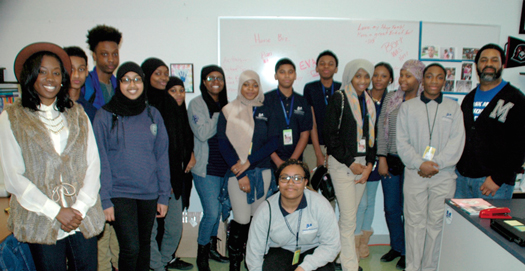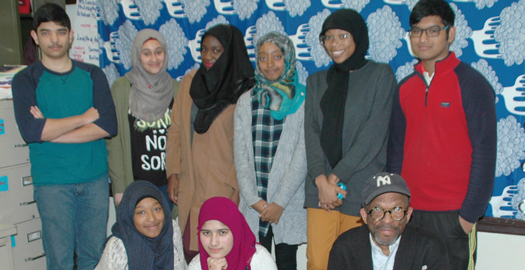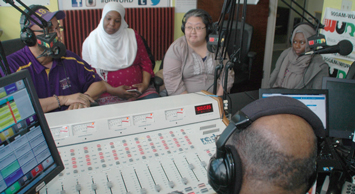Young Muslims And Educators Discuss Anti-Islamic Bigotry, Marginalization
By Jehron Muhammad -Contributing Writer- | Last updated: Mar 23, 2016 - 1:18:01 PMWhat's your opinion on this article?

Group photo of students at Master Shoemaker High School after roundtable discussion concerning anti Muslim bigotry. (Far right) Principal Sharif El Mekki. (Far left) Taharah X co-chair of Justice Or Else L.O.C. Photos: Jehron muhammad
|

Roundtable discussion participants at Palumbo HS.
|
PHILADELPHIA—Making sure their high school locations are safe environments where students are appreciated, as much for their academic achievements as they are for their ethnic, racial and religious differences, is how Kate Sundeen, a teacher at the Academy At Palumbo and Sharif El Mekki, principal at Master Shoemaker, suggest is one of their most challenging responsibilities.
As a guest recently on Black talk radio WURD 900AM, on the weekly program Islam Today and hosted by United Muslim Masjid Emir Qasim Rashid, Mr. Sundeen said, even though we make sure our (Muslim) students know they have a safe space, and that staff is accepting … what they (students) are experiencing (anti-Muslim bigotry) is outside of the school.”
This “anti-Muslim bigotry” or “anti-Muslim hate,” are terms that more describe experiences than what’s commonly referred to as “Islamophobia,” said Muslim Wellness Foundation founder and University of Penn Muslim chaplain Kameelah Rashad.

Host of “Islam Today” Qasim Rashid, Univ. of Penn Muslim chaplain and founder of Muslim Wellness Foundation, Kameelah Rashad, Chemistry teacher at Palumbo, Kate Sundeen, 10th grader at Master Shoemaker Charter, Husnaa Hashim.
|
“When we talk about Islamophobia it’s almost like we’re talking about a theoretical concept. But when we talk about bigotry in any form, or hatred and violence in any form, then that brings it back down to a level (of) understanding the emotional impact (of what has occurred).”
In addition, what Sundeen and El Mekki have been doing in their respective schools is validating students fears and showing appreciation for what students have experienced by encouraging dialogue through roundtable discussions. On April 23rd at the Master Shoemaker Charter School, the educators and other members of their coalition said they plan to take these discussions “to the next level.” This includes, a city wide student forum, not only highlighting anti-Muslim bigotry, and the trauma many students are having to live with, but also offering interventions.
Rashad, wearing her therapist hat, said, “I am sure many of the students (at both schools) felt appreciative and grateful for their work of highlighting their (students) dramatic experiences.”
El Mekki during a recent oneon- one with the author attributes Shoemaker’s Muslim friendly atmosphere to “Muslim (students) here feeling that they are a part of a community of their peers.”
He said, “I see all day Muslim and non-Muslims as friends, interacting and studying and working together. I think overall we have a very inclusive community. We’ve worked hard to build an inclusive community. And I think our students perform pretty admirably as a whole.”
Many schools could take a page out of the work going on at Palumbo and Shoemaker.
In fact, according to “Counseling Muslims: Handbook of Mental Health Issues and Interventions,” by Dr. Samurai Ahmed, Schools where there are “Negative teacher attitudes and bias, such as teachers assuming that female students are oppressed because of wearing the hijab, can impact Muslim youth development. Lower teacher expectations, bias in educational assessment, and disparaging remarks by teachers about students’ religious beliefs and practices may be common experience for some young Muslims.” In addition the book offers that, “Due to teacher bias or lack of awareness, teachers may present the current geopolitical situation as a clash of civilizations and Muslims as the ‘other,’ resulting in young Muslims feeling marginalized.”
When it became her turn to address the radio audience, Shoemaker 10th grader and aspiring journalist and poet Husnaa Hashim said, at her school Muslim’s wear their Islam “as a symbol of pride.”
Hashim, who hasn’t experienced much in the way of anti-Muslim bigotry said, “I haven’t had that much experience because I stand up for myself.” She in addition, mentioned the “juncture of Islamophobia and Blackness,” or the double discrimination that African American Muslims have historically had to face.
During a recent talk about bullying at Upper Darby High School Kameelah Rashad said afterwards, she was approached by several Muslim students.
“Fighting back tears they related their “heartbreaking experiences of being ashamed and fearful, of parents who worried constantly about their safety, about changing their (outwardly religious) appearance to reduce the likelihood of (them) being targeted traveling home (at night) from their jobs they held to help support their families.”
In addition to anti-Muslim bigotry, many Muslim public school students feel marginalized because during their annual celebrations of Eid Al- Fitr (feast of Ramadan) and Eid Al- Adha (the Feast of Sacrifice, marking the end of the annual Hajj pilgrimage to Mecca), are not school sanctioned holidays, like Jewish and Christian recognized holidays. The fact that Muslim students make up 20 percent of Philadelphia’s school population makes it double important that this “inequity is corrected,” says Eid Coalition chair Michael Rashid. For more information go to phillyeid.org.
INSIDE STORIES AND REVIEWS
-
-
About Harriett ... and the Negro Hollywood Road Show
By Rabiah Muhammad, Guest Columnist » Full Story -
Skepticism greets Jay-Z, NFL talk of inspiring change
By Bryan 18X Crawford and Richard B. Muhammad The Final Call Newspaper @TheFinalCall » Full Story -
The painful problem of Black girls and suicide
By Charlene Muhammad -National Correspondent- » Full Story -
Exploitation of Innocence - Report: Perceptions, policies hurting Black girls
By Charlene Muhammad -National Correspondent- » Full Story -
Big Ballin: Big ideas fuel a father’s Big Baller Brand and brash business sense
By Bryan Crawford -Contributing Writer- » Full Story






 Click Here Stay Connected!
Click Here Stay Connected!








